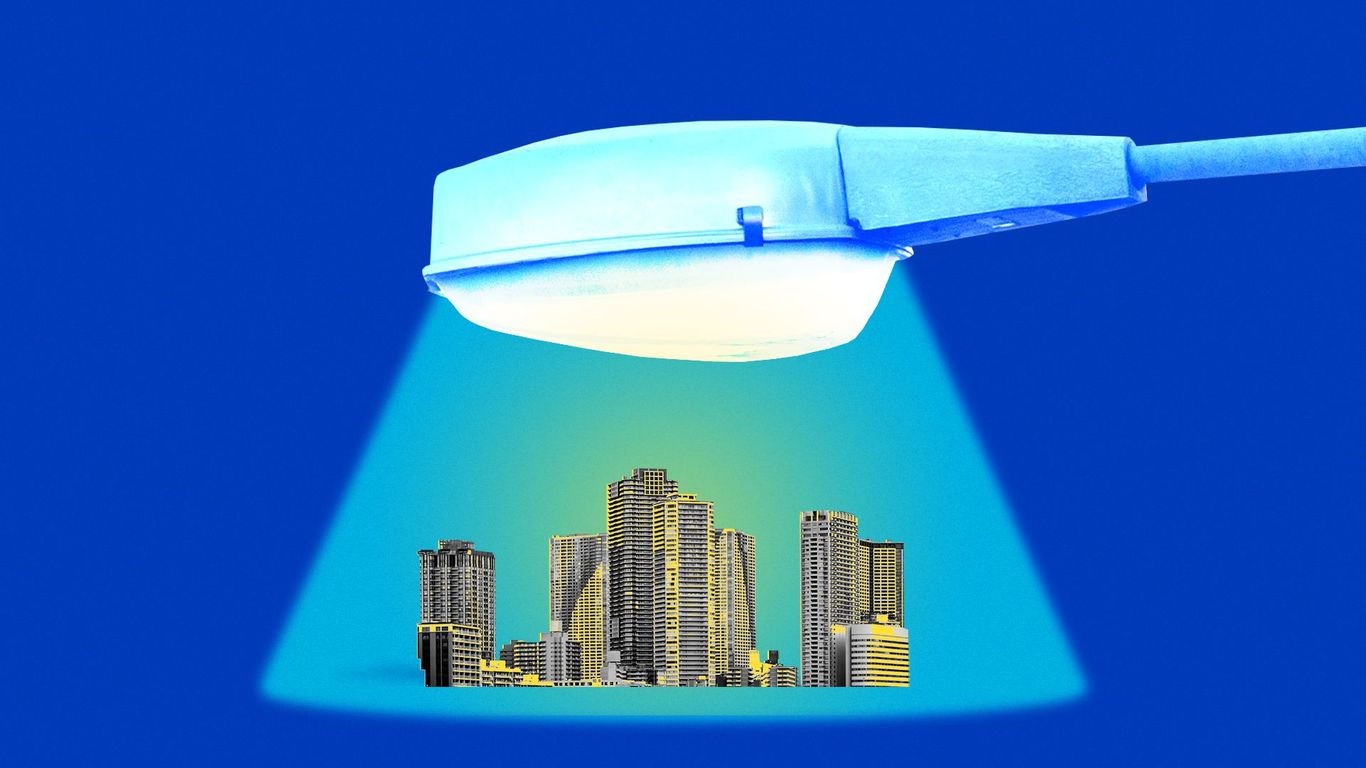
Cities are rushing to replace their legacy street lights with "smart" LED fixtures that could one day be able to find you a parking space, monitor air quality, and announce an oncoming thunderstorm.
Why it matters: Despite a bumpy and controversial start to some smart street light programs, cities are saving tons of money on energy by banishing halogen bulbs — and may soon be able to turn a profit by monetizing data from smart LED sensors or leasing space on light poles.
The big picture: There's been lots of hype about "smart cities," where connected technology helps governments serve us better — but also lots of money wasted on expensive projects that fizzled or caused public outcry over police use of camera surveillance.
Today, hopes have coalesced around the potential for "smart" street lights, which bear sensors that can do everything from analyzing traffic patterns to assisting 911 operators.
- "Streetlights are becoming the backbone of larger smart city initiatives," per a report by the Northeast Group, a smart cities market intelligence firm.
- Cities will invest $8.2 billion in them in the next 10 years, the report said.
- It will take time: "Overall, over 90% of streetlights will be LED by 2029 and 35% will be connected," Northeast Group said.
Cities large and small — including Chicago, Atlanta, Los Angeles, Philadelphia and Cleveland — have been replacing traditional streetlights with LEDs, which consume less energy and can be programmed to dim or or brighten as needed.
- "Street lighting can be up to 40% of a city's energy bills, so you see huge cost savings across the board," Benjamin Gardner, president of the Northeast Group, tells Axios.
- Sensors placed on streetlights have manifold applications and will have more in the future.
- An Intel white paper envisions a day when street lights do everything from traffic and parking control to guiding people out of danger during an emergency (by flashing in the direction of evacuation).
"The vision here is to augment the existing infrastructure via the cloud to allow data and additional functionality to flow through what was a dumb asset," Martin Stephenson, head of North America systems & services for Signify, a major connected lighting vendor, tells Axios.
But, but, but: There's been pushback on various fronts.
- Surveillance: San Diego got scolded by community activists after its police started using video from its $30 million "Smart Streetlights" program.
- Aesthetics: Light poles gunked up with sensors, cameras and advertisements can look hideous.
- Health: "Cities and towns throughout Northern California are issuing ordinances that would exclude new 5G cell sites from residential areas, citing supposed health concerns," per the WSJ.
Smart street light experts say the industry has taken heed from the San Diego debacle and pulled back on intrusive applications.
What's next: Cities hope eventually to turn their smart street lights into cash cows — some of which is happening today.
- The poles can serve as billboards where companies buy ad space.
- 5G providers and others can pay monthly fees to hang their equipment on light poles.
- The brass ring for cities is to compile data from smart street lights and sell it for profit.
The bottom line: "We're seeing a lot of cities buying back their street lights from utilities," Gardner tells Axios.
- "Because all of a sudden, they've woken up to the fact that, hey — you know, the boring, kind of arcane corner of the municipal infrastructure space, the street light poles? They're actually critical assets that we need to own and control."
"smart" - Google News
February 11, 2021 at 05:40PM
https://ift.tt/2LDMFPI
The future of "smart" cities is in street lights - Axios
"smart" - Google News
https://ift.tt/2P2kUhG
https://ift.tt/3febf3M
Bagikan Berita Ini














0 Response to "The future of "smart" cities is in street lights - Axios"
Post a Comment